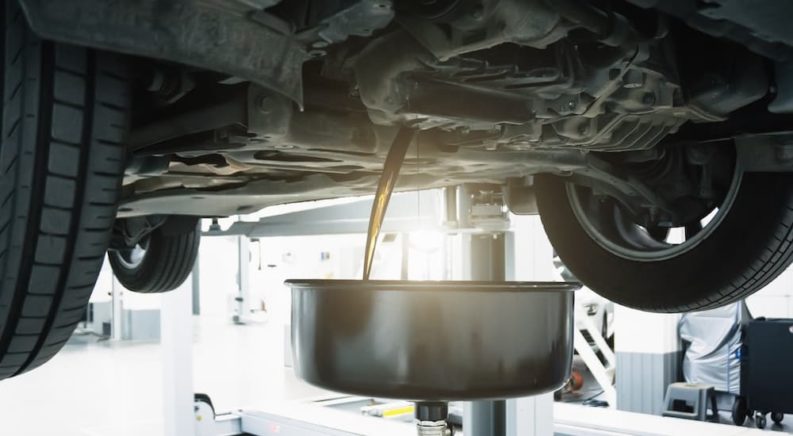Drivers looking for an oil change have no shortage of options. While the D.I.Y. approach is always on the table, fewer and fewer drivers are choosing to do the job themselves in favor of professional service from quick lube joints, auto shops, and dealerships. Among these three options, quick lube and auto shops remain the most popular choices for those seeking a speedy oil and filter change, with 65 percent of drivers opting to have their maintenance work performed by non-dealership service facilities. While there’s the general impression that these routes provide a faster and cheaper alternative to dealership service, that’s not really true. There are numerous benefits to getting your oil and filter changed at the same dealership where you purchased your vehicle with skill, professionalism, higher-quality components, and even price and convenience, all making the list.
Brand Knowledge
Brand knowledge is one of the single best reasons to go with a dealership next time your Honda’s maintenance light comes on. Simply put, no one knows your vehicle quite as well as the place that sold it to you, and that sort of expertise can pay dividends even when it comes to routine maintenance tasks like an oil and filter change. The technicians servicing your vehicle have likely worked on the exact same make and model countless times, giving them the sort of expertise that only that sort of repetition can provide. They know what type of oil to use and, more importantly, how certain driving habits, local weather conditions, or other factors could affect the vehicle. This might lead them to recommend a different type of oil for certain scenarios, such as a lighter-weight oil in the colder winter months.
That’s not to say that quick lube shops and run-of-the-mill mechanics don’t know what they’re doing, but there’s something to be said for experience, especially when it comes to letting someone else tinker under the hood of your vehicle. It doesn’t take too much time on the internet to uncover some quick lube horror stories, such as a vehicle with two oil drain plugs that, due to the employee’s lack of familiarity with the model, only had one plug removed during the oil change process. This sort of oversight can easily result in an overfill which, due to the resulting increase in oil pressure, will put more stress on the seals and gaskets that keep the oil where it’s supposed to be.
Original Parts and Supplies
Original parts and supplies, known as Original Equipment Manufacturer (OEM) parts in the industry, are components that are made by the same company that makes the vehicle. This is opposed to what’s known as aftermarket parts, which are those produced by various companies and are designed to be compatible with as many makes and models as possible. This might seem like a fussy distinction to some, but those who know cars know that there’s no beating OEM quality and fit. Dealerships know this, which is why they overwhelmingly use OEM parts and supplies for everything from major overhauls to quick maintenance tasks like oil and filter changes.
Quick lube and auto shops, on the other hand, tend to use more generalized parts and supplies as it’s easier, and cheaper, to keep a few universal brands on hand rather than stocking up on OEM components for every brand that might roll through the service bay. These shops don’t tend to offer a wide range of oil weight options, so if your vehicle is calling for 0W20 and all they have on hand is 5W30, you’ll be out of luck. Sure, they might have what you’re looking for, but it’ll often come at a surcharge that can rapidly erode the cost-savings associated with such outfits. This issue is even more pronounced when it comes to oil filters, where OEM options tend to offer improved performance and longevity over aftermarket parts.

Convenience
Convenience might be the one area where quicker options offer an advantage over the dealership, but it all depends on how you define the term. No, you can’t usually roll into a dealership and expect them to point you to the next available service bay, but when you consider some of the perks that come with the service, it can be a much more pleasant experience altogether. From well-stocked waiting rooms and free Wi-Fi to complimentary shuttle service and the absence of heady fumes, the dealership experience is altogether different from what drivers might experience at their local lube or auto shop.
A quick lube shop is just that: quick. You can usually roll by your local lube shop and tell at a glance whether it’s a good time for some spontaneous service, but with a little planning, a dealership can be just as convenient. This is especially true of oil and filter changes which, not being as time-sensitive as some other maintenance and repair tasks, often aren’t the type of emergency that needs immediate attention. By booking a service appointment in advance, you can skip the lines you might experience at a quick lube shop, allowing you to plan your oil change around your day rather than the other way around.
Maintain Warranty
A new vehicle warranty often specifies a rigid schedule for when service needs to be performed, but despite what you might have heard, you don’t actually have to get all maintenance and repair work done at a dealership to maintain your vehicle’s warranty. By law, automakers cannot void a warranty when drivers seek outside maintenance service, so why go with a dealership? Well, the law and the real world are often two different things, and all too often, automakers will look for any excuse not to cover a repair for a vehicle under warranty. This can be circumvented by keeping a detailed log of all service and maintenance work performed, including receipts, but it’s not a perfect system.
Say an independent lube shop or mechanic fails to replace the oil after a job, and the engine melts itself into a useless hunk of metal: that’s going to make your warranty worth little more than the paper it’s printed on. Sure, you can chase after the quick lube or auto shop for compensation, but lacking a warranty or any sort of satisfaction guarantee, it could be a lost cause. If you’re looking to play it safe and not give them any wiggle room to pull some funny business, the dealership route gives you an iron-clad record that’s hard to dispute.
Skill
If you’re looking for the best possible service, it’s important to consider who is performing the work. Oil and filter changes might not be the trickiest maintenance tasks under the sun, but more experience is rarely a bad thing when it comes to the fluid that lubricates the single most important and expensive component in your vehicle. Dealerships tend to employ well-trained service technicians who either have an automotive background that includes a degree or certification from an automotive service technology program. They also tend to be much better compensated than their counterparts at the quick lube shop, giving them a little more skin in the game and reason to care about the work they’re performing.
Quick lube shops, on the other hand, don’t tend to have the same sort of background. While companies like Jiffy Lube require their workers to complete a basic training program, it often involves little more than some computer-based training and some on-the-job learning. Often taking less than a week, these programs are little substitute for knowing the ins and outs of a vehicle in the way that the average dealership service technician might. The lower rate of pay when compared to dealerships also means more employee turnover, with experience and institutional knowledge suffering as a result.
Relationships
A dealership has a vested interest in keeping you happy. Not only do they want you to return for future maintenance and repair service, they’re also hoping that when it comes time to buy a new vehicle, you’ll fondly remember the work they’ve done on your previous ride and make them your first stop. Quick lube and auto shops don’t have the same potential for profit, which can result in a more impersonal service experience. If you decide not to return after an oil and filter-related mishap, they’re only out $40 as opposed to a dealership that might fear missing out on that $30,000 sale they can make down the road.
Additionally, quick lube and auto shops might try to upsell you, pressuring their employees to load up customers with all sorts of unnecessary services and add-ons in a bid to make a few extra bucks. This is especially prevalent at quick lube shops where, due to the lower rate of pay, employees rely on these sorts of upsells to round out their paychecks. Case in point: in 2016, 37 Jiffy Lube shops in California were fined $220,000 and given three years probation as part of a sting operation for unnecessary upselling that included hocking new air filters and other services.
Cost Savings
Lastly, we come to the biggest misconception around the difference between dealerships and quick lube and auto shops: price. Call it good marketing on the part of quick lube shops, which often include their standard oil change price as part of their signage, but you just can’t seem to get drivers to shake the idea that dealerships are going to cost an arm and a leg in comparison. While it’s true that dealerships often charge more than the rock-bottom prices of quick lube and auto shops, it’s important to consider what you’re getting for your money. The standard $40 oil change at a quick lube shop is likely only going to cover conventional motor oil, not the pricier synthetic blends ($65), full synthetic ($75), and high-mileage ($60) fluids that so many of today’s vehicles actually call for.
An oil and filter change at a dealership will typically cost around $60 to $70 but comes with the added confidence of knowing that your vehicle is getting exactly the type of motor oil it was designed to operate with. Dealerships also tend to run a wide range of deals and specials to sweeten the pot and draw in customers, either in the form of money-saving coupons or additional services like a multi-point inspection, wash and vacuum service, and fluid top-off. Such offers can go a long way in improving the value of a dealership service when compared to other options and have the added benefit of giving the technicians a chance to spot any emerging automotive issues before they can balloon into big-ticket repairs.

There Are Many Benefits to Getting an Oil Change at a Dealership
From brand knowledge and convenience to relationship-building and OEM parts and supplies, there are plenty of reasons to go with a dealership when it comes time for your next oil and filter change. This is particularly true for drivers who see themselves moving on from their current vehicle in the near future since having all your maintenance and repair work performed at a dealership will likely net you a much more competitive offer when it comes time to trade in your old ride for a new model. Quick lube and auto shops are a handy alternative in some cases, but if you want to ensure the best possible service at a competitive price, there’s no beating a dealership. We’re not exactly sure how they got such a bad rap in the first place, but when you start to look at the facts, you’ll soon realize that there’s little reason to go the quick lube or auto shop route over a dealership.

